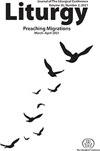Symbolized Reality: Liturgy and Tabletop Role-Playing Games
IF 0.3
0 RELIGION
引用次数: 0
Abstract
In recent years, tabletop role-playing games have surged in popularity. The reasons for this may vary, but a central feature of what tends to make tabletop role-playing games compelling for many players is the ability the games afford to connect with a character, party, or storyline in a way that moves significantly beyond participation as an observer or consumer of content. Creative agency is involved—sometimes significantly so—on the part of the players, the narrator/ game facilitator, and the group as a whole. The experience itself becomes crafted beyond the simple adding-up of story, game mechanics, and player participation. The fantasy worlds that the participants inhabit become something more than simulation; they often symbolize aspects of players’ lives. By this I do not mean that they exhibit some surface-level one-to-one representation of things or concepts that echo the realities from which participants come. I mean instead that the work of symbolization—of mediation of meaning, presence, and identity—can take place in the context of the game by a multitude of ways that vacillate in both intensity and relevance depending upon the game’s context, the context of the group playing it, and the contexts that individual participants bring to it. The symbolization that unfolds in a tabletop role-playing game is in some significant respects quite similar to symbolism at play in liturgical celebration (in kind if not in content). The central aim of this discussion, after briefly explaining what I mean by symbol and symbolization, is to unpack two main ways that tabletop role-playing games symbolize reality: in the communal experience of revelation, and in the practice of forming and reforming (and, often enough, malforming) approaches to ethics. Following this, I will conclude by arguing that liturgy itself can learn from these tendencies of tabletop role-playing games, most especially in the richness that necessarily depends upon a certain level of letting-go or stepping away from attempting to control the ritual, its particular contents, and its results. A word of clarification (or perhaps caution) before continuing: I do not mean to maintain that tabletop role-playing games are liturgies, nor that they are liturgical in all the ways that Christian rituals are liturgical. Indeed, role-playing games have known a significant amount of suspicion (and even “moral panic”) specifically from religious communities, and while this is no longer as potent, it is also not completely absent. In this light I wish to tread carefully and keep my claims modest; tabletop role-playing games may be thought of as pseudo-liturgical in particular ways that are illustrative for liturgy itself (e.g., symbolizing reality, being predicated upon a communal experience of revelation, forging and clarifying approaches to ethics). This is where my claims stop.符号化的现实:礼仪和桌面角色扮演游戏
近年来,桌面角色扮演游戏大受欢迎。原因可能各不相同,但桌面角色扮演游戏吸引许多玩家的一个核心特征是,游戏能够与角色、派对或故事情节建立联系,远远超出了作为内容观察者或消费者的参与范围。创意代理涉及玩家、解说员/游戏促进者以及整个团队,有时甚至非常重要。体验本身超越了故事、游戏机制和玩家参与的简单相加。参与者所居住的幻想世界不仅仅是模拟;它们往往象征着玩家生活的方方面面。我的意思并不是说他们对事物或概念表现出某种表面层面的一对一的表现,与参与者所处的现实相呼应。相反,我的意思是,象征性的工作——意义、存在和身份的中介——可以在游戏的背景下通过多种方式进行,这些方式在强度和相关性方面都会摇摆不定,这取决于游戏的背景、玩游戏的群体的背景以及个人参与者给游戏带来的背景。桌面角色扮演游戏中展现的象征性在某些重要方面与仪式庆典中的象征性非常相似(如果不是内容,则是实物)。在简要解释了我所说的符号化和象征化的含义后,本次讨论的中心目的是揭示桌面角色扮演游戏象征现实的两种主要方式:在共同的启示体验中,以及在形成和改革(通常是渎职)伦理方法的实践中。在此之后,我将最后指出,礼拜仪式本身可以从桌面角色扮演游戏的这些趋势中学习,尤其是在丰富性方面,这必然取决于在一定程度上放弃或放弃对仪式、其特定内容及其结果的控制。在继续之前,请澄清一下(或者谨慎一点):我并不是说桌面角色扮演游戏是礼拜仪式,也不是说它们在基督教仪式的所有方面都是礼拜仪式。事实上,角色扮演游戏已经知道了大量的怀疑(甚至“道德恐慌”),特别是来自宗教团体,虽然这不再那么有力,但也并非完全没有。有鉴于此,我希望谨慎行事,并保持我的主张适度;桌面角色扮演游戏可能被认为是伪礼拜仪式,其特定方式可以说明礼拜仪式本身(例如,象征现实,以共同的启示体验为前提,构建和澄清道德方法)。这就是我的索赔停止的地方。
本文章由计算机程序翻译,如有差异,请以英文原文为准。
求助全文
约1分钟内获得全文
求助全文

 求助内容:
求助内容: 应助结果提醒方式:
应助结果提醒方式:


